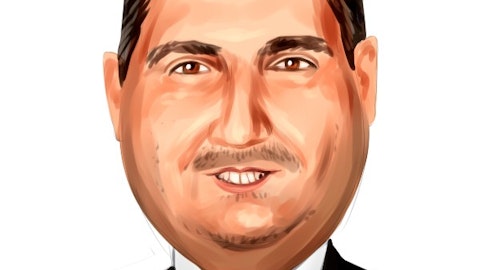We have some increase in corporate costs, things like our equity, stock equity compensation or incentive compensation because we’re assuming that we’ll meet targets more fully in 2023 than we did in 2022, so that sort of thing. So I think slightly increasing margins on the behavioral side, slightly declining on the acute side and some kind of disparate sort of cost increases on the corporate side to get to the full budget guidance that we provided.
Marc Miller: And with regards to your question on inpatient versus outpatient, I mean, I think we’re seeing what many are seeing, which is a continued shift to outpatient that has been accelerated through the pandemic we’re trying to continue to do a lot of the things that we’ve been doing in the last few years, which is to ensure that we have the proper paste load in our inpatient surgical areas especially with the increases in costs for staffing those areas, we want to make sure that we have the proper acuity. We’re not doing low-level cases, really outpatient cases in an inpatient setting where we can’t cover the cost properly. So our shift, I think, is pretty similar to a lot of others. We are also trying to accelerate our development of surgical centers so that we have more opportunities and more platforms for all of our surgery cases in as many markets as possible. So we continue to develop those as we find opportunities to do so.
Operator: Thank you. Our next call comes from the line of Pito Chickering with Deutsche Bank.
Pito Chickering: Behavioral €“ can you hear me?
Operator: Yes.
Steve Filton: Yes, we can hear you now.
Pito Chickering: Okay. There we go. On behavioral, how many beds left that you can’t staff? And how do you think that ramps or during 2023? And as staffing and behavior becomes easier post-COVID, I’m wondering what areas of health care were the biggest source of those hires? And then finally, as you can start staffing again, do you increase your CapEx for behavioral beds to keep driving growth there over the next few years?
Steve Filton: Yes. So Pito, it’s €“ I’ll give you a number. I mean, I think we’re down to a few hundred beds in behavioral that we would consider capped on most days. Now to be fair, that number can change literally day-to-day, et cetera. So we do still feel like the patients are turned away in certain situations because we don’t have appropriate staffing a lot of times that may be specific to, let’s say, weekend or overnight staffing it really does differ by facility. But you’re right. I mean that’s probably been the single biggest headwind for the behavioral business during the pandemic in large part because we were losing employees, mostly nurses, but other clinical personnel, therapists, psychologists, et cetera to other settings where either they have the opportunity to work remotely or they had the opportunity to work in an acute care setting, making sort of premium dollars.
As those opportunities have declined and I think telemedicine procedures have intended to decline as the pandemic has eased and certainly, the demand from acute care hospitals for COVID treating nurses, I think, has declined as well. We’re seeing more of those nurses return to what I would describe as the behavioral fold. To your sort of last question, yes, I mean, obviously, we’ve been more tempered, if you will, about behavioral capacity addition during the pandemic because the thought was what’s the point of adding additional capacity if we’re not going to be able to staff it. But as those staffing pressures continue to ease, I think we’ve made the point throughout the pandemic that we think that the underlying demand for behavioral services across the full continuum is quite strong and robust, and we still believe that.
And so yes, we are certainly looking and trying to gauge in individual markets where additional capacity may be called for because the demand is there and because we feel like we can adequately staff any additional capacity that we’ve built.
Pito Chickering: Great. Thanks so much.
Operator: Thank you. Our next call will come from the line of Kevin Fischbeck with Bank of America. Kevin, please wait until you hear your name announced. Kevin?



